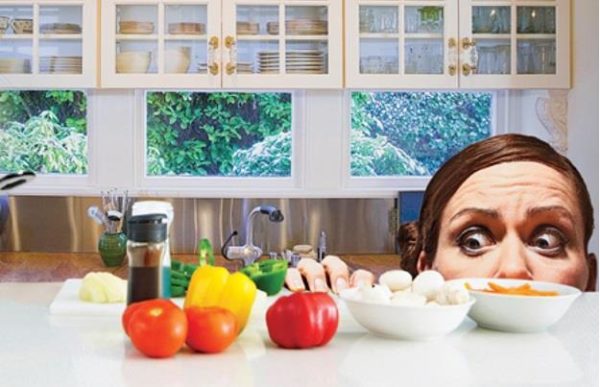Listen to Linda Milburn in action with Nova radio
Listen in on how she hypnotised Nat from the Nova Crew and one of her listeners in overcoming a bad habit
Let Linda personally help you overcome your bad habits, disorders or overwhelming problems
Dealing with Food phobias Through Hypnotherapy

We’ve all had to face the prospect of trying out food that we’ve never eaten before or of having to eat something we don’t particularly enjoy. For most children, vegetables are simply gross, and many adults don’t like a particular dish or foodstuff. New foods can be scary too. We have no idea how it will taste, whether we’ll enjoy it or not, and what effect it’ll have on our bodies. For most people, a dislike of the odd dish or drink may not seem all that frightening, but for others, food can present a challenging obstacle.
It is important to understand the difference between eating disorders and food phobias. While it may be easy to consider both as similar challenges, there is a clear difference here. People dealing with eating disorders generally associate eating with their body image, while people who live with food phobias experience a sometimes-acute fear of the food itself, or the act of making/preparing it.
Defining Food phobias – What is Cibophobia?
The fear of food can have a profound effect on our lives, from making it difficult to enjoy food with friends and family to having a destructive impact on our physical wellbeing and mental health. We unpack the nature of food phobias and explore just how hypnotherapy can assist in helping us overcome a fear of one of the very things we need to stay alive.
A food phobia – also called cibophobia – describes a severe, often irrational fear of food. This may be limited to include a fear of a particular dish or type of food or can apply to entire categories of food. Some food phobias can lead to mild symptoms, including dry mouth, nausea and to trembling, while others can trigger more serious ones, including panic, shortness of breath, or losing consciousness.
Types of Food phobias – Common Issues Relating to Cibophobia
While food phobias aren’t limited to a specific set of causes or foods, these debilitating conditions can sometimes be attributed to specific foods or food states. Perishable foods can trigger a sufferer to worry about the freshness of the foodstuff, while some foods like baked goods and meats can cause undercooking concerns. Sometimes, people may experience anxiety over who prepared their food, while expiration dates and even the notion of eating leftovers can trigger a panic attack.
• Fear of New Foods (Food Neophobia)
A fear of new foods is actually a relatively common occurrence and can sometimes be misinterpreted as someone who is a ‘picky’ or ‘fussy eater. This can often lead to a person leaving out critical components of a balanced diet as they stick to ‘tried-and-tested’ foods, resulting in mineral, vitamin or calorie deficiencies.
• Fear of Cooking (Mageirocophobia)
No, we’re not talking about partners who don’t enjoy cooking; we’re referring to people who have a genuine fear of food that is no longer in its raw or natural state. This fear can come from anxiety around who handled, processed and packaged food to distress around applying heat or any external conditions to food in general.
• Fear of Vomiting (Emetophobia)
While nobody likes throwing up, vomiting is a natural process that allows our bodies to expel toxic foodstuffs or alleviate overeating. People facing emetophobia will do anything it takes, even to avoid the risk of vomiting – including not eating enough food in the first place.
While some people may be able to relate to one or more types of food phobias mentioned above, others may experience more unique or specific symptoms. It is important to understand what food phobia you’re facing and whether or not it is related to an eating disorder rather than a fear of food itself.
If you’re struggling with an eating disorder, this article may be very helpful: Xhallenging bad eating habits through Hypnotherapy.
How Hypnotherapy Can Help – Addressing the Causes of Cibophobia
Like many other phobias, hypnotherapy is an excellent tool for addressing fear of food. Because most phobias are misunderstood and difficult to treat, hypnotherapy is an effective treatment for accessing the root cause of the problem and confronting it in a relaxed, controlled state.
Hypnotherapists, like those at Hypnocare, are excellent at working with clients, first to understand the problems that can trigger challenges like cebophobia and then develop effective techniques to address them. Once a deep state of relaxation has been induced, therapists are able to reach into the subconscious and work with the Clients to address the sometimes-deep-seated causes of food phobias before helping them to find ways to refocus their minds on mechanisms that can aid them in managing and even completely overcoming the issues that drive a fear of food.
Food is an important and central part of our lives, and we shouldn’t have to live with a fear of it. Hypnotherapy is proven to help people face their fears, not just of food, but of many other things too.
CHANGE YOUR MIND AND CHANGE YOUR LIFE!
CALL NOW FOR A FREE 15 MIN CONSULT
CLINIC AND ONLINE SESSIONS AVAILABLE
Perth/Fremantle Call Linda 0409079435
Midland/Mundaring Call Jan 0423936933
Medical Disclaimer
Results will vary from person to person.
For More Information & Disclaimer: Full Medical Disclaimer Here
Hypnocare Hypnosis Clinic Fremantle
Linda Milburn
Located in Hilton, 3 min from Fremantle, WA.
Phone:
0409 079 435
08 9388 6322
Hypnocare Hypnosis Clinic Darlington
Contact: Jan
Phone:
0423 936 933

Linda Milburn
Involved in Natural Healing for over 30 years
Fellow Member of the (AHA) Australian Hypnotherapist Association
Past SEO and Board Member of the AHA for 8 years
.

